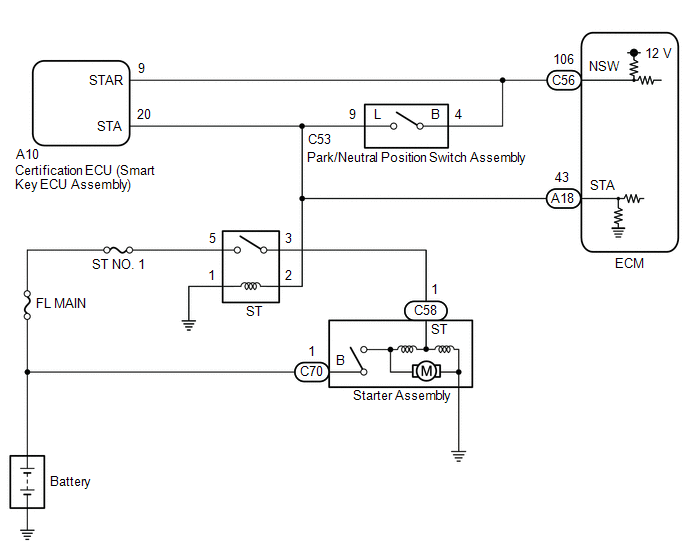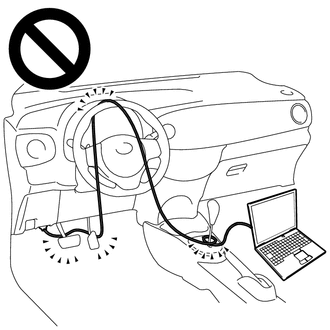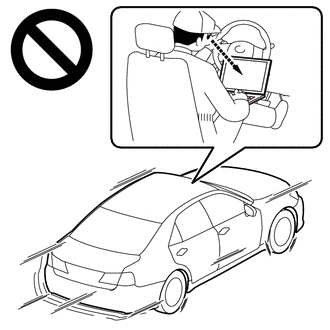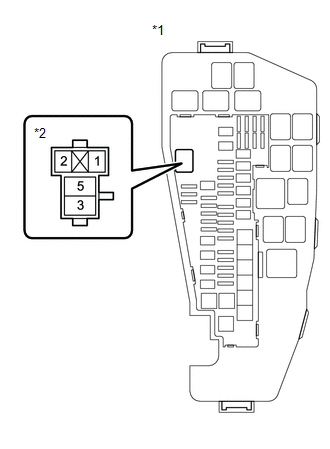- DTC judgment completed
- System normal
| Last Modified: 09-10-2025 | 6.11:8.1.0 | Doc ID: RM100000001ARMZ |
| Model Year Start: 2019 | Model: Avalon | Prod Date Range: [04/2018 - ] |
| Title: UA80E (AUTOMATIC TRANSMISSION / TRANSAXLE): AUTOMATIC TRANSAXLE SYSTEM: P061512; Starter Relay Circuit Short to Battery; 2019 - 2022 MY Avalon [04/2018 - ] | ||
|
DTC |
P061512 |
Starter Relay Circuit Short to Battery |
DESCRIPTION
While the engine is being cranked, battery voltage is applied to terminal STA of the ECM.
If the ECM detects the starter control (STA) signal while the vehicle is being driven, it determines that there is a malfunction in the STA circuit. The ECM then illuminates the MIL and stores this DTC.
This monitor runs when the vehicle is driven at 20 km/h (12 mph) or more for 20 seconds or more.
|
DTC No. |
Detection Item |
DTC Detection Condition |
Trouble Area |
MIL |
Memory |
Note |
|---|---|---|---|---|---|---|
|
P061512 |
Starter Relay Circuit Short to Battery |
All of the following conditions are met (1-trip detection logic):
|
|
Comes on |
DTC stored |
SAE Code: P0617 |
MONITOR STRATEGY
|
Related DTCs |
P0617: Starter signal/Verify input signal |
|
Required sensors/components (Main) |
ST relay, Park/neutral position switch assembly, Certification ECU (Smart Key ECU Assembly) |
|
Required sensors/components (Sub) |
Vehicle speed sensor (VSS), Crankshaft position (CKP) sensor |
|
Frequency of operation |
Continuous |
|
Duration |
20 sec. |
|
MIL operation |
Immediate |
|
Sequence of operation |
None |
TYPICAL ENABLING CONDITIONS
|
The monitor will run whenever the following DTCs are not stored |
None |
|
Battery voltage |
10.5 V or more |
|
Engine switch |
On (IG) |
|
Vehicle speed |
20 km/h (12.43 mph) or more |
|
Engine speed |
1000 rpm or more |
TYPICAL MALFUNCTION THRESHOLDS
|
Starter signal |
ON |
CONFIRMATION DRIVING PATTERN
CAUTION:
When performing the confirmation driving pattern, obey all speed limits and traffic laws.
HINT:
- Connect the Techstream to the DLC3.
- Turn the engine switch on (IG) and turn the Techstream on.
- Clear the DTCs (even if no DTCs are stored, perform the clear DTC procedure).
- Turn the engine switch off and wait for 2 minutes or more.
- Turn the engine switch on (IG) and turn the Techstream on.
- Start the engine.
-
Drive the vehicle for 20 seconds or more with the following conditions met [*1]:
- Engine speed is 1000 rpm or more.
-
Vehicle speed is 20 km/h (12 mph) or more.
HINT:
[*1] : Normal judgment procedure.
The normal judgment procedure is used to complete DTC judgment and also used when clearing permanent DTCs.
- Stop the vehicle.
- Enter the following menus: Powertrain / Transmission / Utility / All Readiness.
- Input the DTC: P061512.
-
Check the DTC judgment result.
Techstream Display
Description
NORMAL
ABNORMAL
- DTC judgment completed
- System abnormal
INCOMPLETE
- DTC judgment not completed
- Perform driving pattern after confirming DTC enabling conditions
N/A
- Unable to perform DTC judgment
- Number of DTCs which do not fulfill DTC preconditions has reached ECU memory limit
HINT:
- If the judgment result shows NORMAL, the system is normal.
- If the judgment result shows ABNORMAL, the system has a malfunction.
- If the judgment result shows INCOMPLETE or N/A, perform the normal judgment procedure again.
WIRING DIAGRAM

CAUTION / NOTICE / HINT
CAUTION:
-
Strictly observe posted speed, limits, traffic laws and road conditions.

- Do not drive the vehicle with the cable of the Techstream contacting the pedals, shift lever or steering wheel.
- Driving the vehicle with the cable of the Techstream contacting these areas could impede vehicle control, resulting in a serious accident.
-
Do not operate the Techstream while driving the vehicle.

- Operating the Techstream while driving the vehicle will prevent you from paying sufficient attention to vehicle surroundings, and could result in a serious accident.
NOTICE:
PROCEDURE
PROCEDURE
|
1. |
READ VALUE USING TECHSTREAM (STARTER SW) |
(a) Connect the Techstream to the DLC3.
(b) Turn the engine switch on (IG).
(c) Turn the Techstream on.
(d) Enter the following menus: Powertrain / Transmission / Data List / Starter SW.
Powertrain > Transmission > Data List
|
Tester Display |
Measurement Item |
Range |
Normal Condition |
Diagnostic Note |
|---|---|---|---|---|
|
Starter SW |
Starter signal |
OFF or ON |
|
- |
Powertrain > Transmission > Data List
|
Tester Display |
|---|
|
Starter SW |
(e) Read the Data List according to the display on the Techstream.
OK:
|
Condition |
Starter SW |
|---|---|
|
Engine switch on (IG) |
OFF |
(f) Read the Data List according to the display on the Techstream while the vehicle is being driven with an engine speed of 1000 rpm or more at a vehicle speed of 20 km/h (12 mph) or more.
OK:
|
Condition |
Starter SW |
|---|---|
|
Driving at 20 km/h (12 mph) or more (engine speed 1000 rpm or more) |
OFF |
HINT:
If the result of either of the above is not as specified, proceed to the next step with the engine switch on (IG), the Techstream connected and Data List item "Starter SW" selected.
HINT:
If the starter assembly operates continuously when the engine switch is turned on (IG), proceed to the next step without reading the Data List item "Starter SW".
| OK |

|
| NG |

|
|
2. |
INSPECT ST RELAY (CHECK FOR SHORT CIRCUIT) |
(a) Enter the following menus: Powertrain / Transmission / Data List / Starter SW.
Powertrain > Transmission > Data List
|
Tester Display |
Measurement Item |
Range |
Normal Condition |
Diagnostic Note |
|---|---|---|---|---|
|
Starter SW |
Starter signal |
OFF or ON |
|
- |
Powertrain > Transmission > Data List
|
Tester Display |
|---|
|
Starter SW |
(b) Remove the ST relay from the No. 1 engine room relay block and No. 1 junction block assembly.
(c) Read the Data List according to the display on the Techstream.
|
Result |
Proceed to |
|---|---|
|
The Data List item "Starter SW" does not change from ON. |
A |
|
The Data List item "Starter SW" changes from ON to OFF. |
B |
HINT:
- When the result of the above inspection is "The Data List item "Starter SW" does not change from ON", the ST relay is normal.
- DTCs may be stored during this inspection. Check for DTCs and clear them using the Techstream.
| B |

|
REPLACE ST RELAY |
|
|
3. |
CHECK TERMINAL VOLTAGE (POWER SOURCE OF ST RELAY) |
HINT:
The purpose of this step is to check for ST relay terminal voltage under abnormal conditions.
|
(a) Remove the ST relay from the No. 1 engine room relay block and No. 1 junction block assembly. |
|
(b) Turn the engine switch on (IG).
(c) Measure the voltage between ST relay terminal 2 and body ground.
HINT:
- Make a note of the measured voltage as it will be necessary for inspecting the change in voltage in the next step. As the next step should be conducted under the same conditions, keep the engine switch on (IG) and do not install the ST relay.
- DTCs may be stored during this inspection. Check for DTCs and clear them using the Techstream.
-
If any voltage was measured with the engine switch on (IG), one of the following malfunctions is suspected:
- Short to +B in the circuit of a connected ECU or park/neutral position switch assembly.
- Short to +B in the wire harness.
|
|
4. |
INSPECT PARK/NEUTRAL POSITION SWITCH ASSEMBLY (CHECK FOR SHORT CIRCUIT) |
|
(a) Disconnect the C53 park/neutral position switch assembly connector. |
|
(b) Measure the voltage between ST relay terminal 2 and body ground and compare it to the voltage measured in the previous step.
|
Result |
Proceed to |
|---|---|
|
The voltage between ST relay terminal 2 and body ground does not change when the connector is disconnected. |
A |
|
The voltage between ST relay terminal 2 and body ground changes when the connector is disconnected. |
B |
HINT:
- If the voltage is the same before and after disconnecting the connector, the park/neutral position switch assembly is normal.
- DTCs may be stored during this inspection. Check for DTCs and clear them using the Techstream.
| B |

|
|
|
5. |
INSPECT ECM (CHECK FOR SHORT CIRCUIT) |
|
(a) Disconnect the A18 ECM connector. |
|
(b) Measure the voltage between ST relay terminal 2 and body ground and compare it to the voltage measured in the previous step.
|
Result |
Proceed to |
|---|---|
|
The voltage between ST relay terminal 2 and body ground does not change when the connector is disconnected. |
A |
|
The voltage between ST relay terminal 2 and body ground changes when the connector is disconnected. |
B |
HINT:
- If the voltage is the same before and after disconnecting the connector, the ECM is normal.
- DTCs may be stored during this inspection. Check for DTCs and clear them using the Techstream.
| B |

|
|
|
6. |
CHECK HARNESS AND CONNECTOR (ECM - PARK/NEUTRAL POSITION SWITCH ASSEMBLY - SMART KEY ECU ASSEMBLY - ST RELAY) |
(a) Disconnect the A18 ECM connector.
(b) Disconnect the C53 park/neutral position switch assembly connector.
(c) Disconnect the A10 certification ECU (smart key ECU assembly) connector.
(d) Remove the ST relay from the No. 1 engine room relay block and No. 1 junction block assembly.
(e) Measure the resistance according to the value(s) in the table below.
Standard Resistance:
|
Tester Connection |
Condition |
Specified Condition |
|---|---|---|
|
A18-43 (STA), C53-9 (L), A10-20 (STA) or 2 (ST relay) - Other terminals |
Always |
10 kΩ or higher |
| OK |

|
CHECK SMART KEY SYSTEM (CHECK FOR STA TERMINAL VOLTAGE OF SMART KEY ECU ASSEMBLY) |
| NG |

|
REPAIR OR REPLACE HARNESS OR CONNECTOR |
|
7. |
REPLACE ECM |
(a) Replace the ECM.
| NEXT |

|
|
|
|
![2019 - 2022 MY Avalon [04/2018 - ]; UA80E (AUTOMATIC TRANSMISSION / TRANSAXLE): AUTOMATIC TRANSAXLE SYSTEM: DTC CHECK / CLEAR](/t3Portal/stylegraphics/info.gif)

